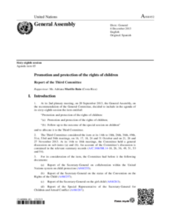The United Nations General Assembly (UN GA) adopted without a vote four resolutions on children’s rights on the 18th December 2013.
- The resolution on Rights of the Child (A/RES/68/147) was the focus of protracted discussions in the Third Committee, the sub-group of the GA responsible for human rights issues, and in particular among the co-drafters of the resolution, the Group of Latin American and Caribbean countries (GRULAC) and the EU. One of the most hotly contended issue was the theme for next year’s children's rights resolution (69th Session in 2014) to be set by this resolution, with deep divisions between countries proposing a focus on strengthening family care and appropriate alternative care, an initiative called for by a large global coalition of NGOs and supported among others by Brazil, and a focus on child migration or children and sustainable development. Very late in the day, a compromise was reached and an all-encompassing theme was chosen:"Progress achieved and challenges to protect children from discrimination and overcome inequalities in the light of the 25 year anniversary of the adoption of the Convention on the Rights of the Child." Although not the result that was hoped for by organizations advocating for children’s care, this theme provides important opportunities for underlining the importance of the issue next year.
- This year’s resolution also includes a section on “Registration, family relations, adoption and alternative care” which recalls the adoption of the Guidelines for the Alternative Care of Children and encourages States “to take the Guidelines into account when adopting, enforcing, improving or implementing policies and programmes to protect children growing up without parents or caregivers, recognizing that efforts should be directed primarily to enabling the child to remain in or return to the care of his or her parents or, when appropriate, other close family members and that, where alternative care is necessary, family- and community-based care should be promoted over placement in institutions”. The resolution also calls on States “to take all necessary measures to prevent and combat illegal adoptions and all adoptions that are not in the best interests of the child.”
- This year’s resolution on the Girl Child (A/RES/68/146) paid particular attention to the issue of child headed households, expressing deep concern about “the extreme vulnerability of children who are heads of households, particularly girls, who may be exceptionally negatively affected by the economic and care burdens placed on them at a young age, which in turn may lead to their having difficulty completing their education and increase their vulnerability to poverty, discrimination, trafficking and physical abuse.” It also highlighted the particular vulnerability of children raised in child-headed households. The resolution called upon States to enact a range of measures to support child headed households and to include “an integrated approach in supporting and empowering child-headed households, given the mental and psychosocial trauma, stigma and physical and economic stress children may experience as a result of becoming heads of households at a very young age”.
- The resolution on Child, Early and Forced marriage (A/RES/68/148) is noteworthy mostly because it decides to convene during the 68th session a panel discussion on the issue globally, including in relation to the elaboration of the post-2015 development agenda, and calls on the UN Secretary General to liaise with relevant agencies, including non-governmental ones to ensure their input in this process.
- The resolution on Strengthening Collaboration on Child Protection within the United Nations system (A/RES/68/145) initiated by the Government of Thailand and was widely perceived as an attempt at questioning the work of the UN ‘special procedures’, including special rapporteurs and other UN Mechanisms, that had highlighted the use of child soldiers in the context of the armed conflict in that country. The draft was revised and became a more generic UN GA resolution, adopted without a vote, stressing the importance of collaboration among relevant UN actors working on child protection and underlining the importance of capacity-building and South-South cooperation in that regard, as well as adequate resources and support for this work through voluntary contributions by States.

